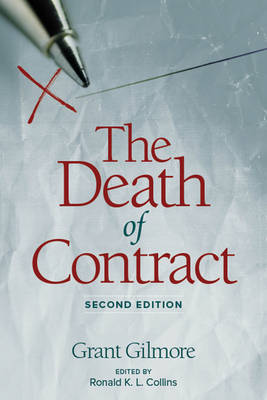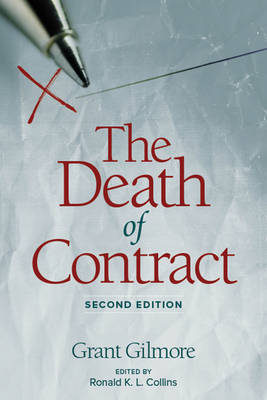
- Retrait gratuit dans votre magasin Club
- 7.000.000 titres dans notre catalogue
- Payer en toute sécurité
- Toujours un magasin près de chez vous
- Retrait gratuit dans votre magasin Club
- 7.000.0000 titres dans notre catalogue
- Payer en toute sécurité
- Toujours un magasin près de chez vous
Description
The Death of Contract is a masterful commentary on the common law, especially the law of promissory obligation known as contracts. In this slim and lively book, the late Yale law professor Grant Gilmore examines the birth, development, death, and even the resurrection of a body of American law. It is both a modern-day reply to and a funeral oration for an American legal classic--Oliver Wendell Holmes's The Common Law. Gilmore argues that the rigid, formalistic approach of classical contract law fails to reflect the realities of modern contractual relationships. He traces the historical development of contract law, highlighting its origins in the nineteenth century and its subsequent decline as courts increasingly recognized the limitations of strict adherence to formal rules, and analyzes how contract law has been absorbed into tort law. He contends that the boundaries between contract and tort have blurred, leading to a more flexible, equitable approach to enforcing promises. This shift reflects broader changes in societal values and the legal system's adaptation to these changes.
The second edition, with an instructive and timely foreword by Ronald K. L. Collins, challenges anyone interested in the life of the law to think about where it has come from and where it is trending. A new bibliography of early reviews and contemporary responses reveals how considerable the interest was, and continues to be, in this modern anti-classic.
Spécifications
Parties prenantes
- Auteur(s) :
- Editeur:
Contenu
- Nombre de pages :
- 216
- Langue:
- Anglais
Caractéristiques
- EAN:
- 9780814206768
- Date de parution :
- 01-10-95
- Format:
- Livre broché
- Format numérique:
- Trade paperback (VS)
- Dimensions :
- 141 mm x 216 mm
- Poids :
- 226 g

Les avis
Nous publions uniquement les avis qui respectent les conditions requises. Consultez nos conditions pour les avis.






